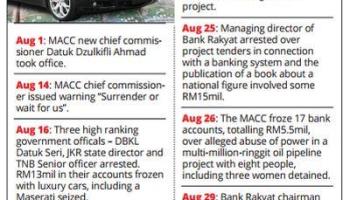Jabatan Air Negeri Sabah - Customer Service
How the millions were stolen?
1. Contracts broken down to small packages of RM100,000 each. This is to ensure the director or the deputy can award the contract.
2. Department carries out a limited tender process whereby between eight and 10 companies registered as contractors with the department are invited to put in their bids.
3. All the companies invited tend to act in concert. The ‘limited tender’ process is ‘fixed’ and given to the lowest bidder.
4. The other companies are paid off for their participation.
5. The project is finally carried out at a fraction of the tendered price.
Senior official: Unprecedented scale of corruption going on since 2010
In a shocking revelation, a senior government official said some 60% – close to RM2bil – of the RM 3.3bil Federal Government allocation for water projects in Sabah was siphoned off into individual pockets.
The projects were broken up into awards of less than RM100,000 each and tendered out to companies owned by the families of two top civil servants.
60% of project allocation stolen
 Under scrutiny: MACC sources said they had identified 40 witnesses, mainly state Water Department officials, to have their statements recorded.
Under scrutiny: MACC sources said they had identified 40 witnesses, mainly state Water Department officials, to have their statements recorded.KOTA KINABALU: It’s shocking. Sixty sen out of every ringgit allocated by the Federal Government for water projects was siphoned off into the pockets of many individuals.
A senior state government official said only 40% of the federal allocations for water reached the ground in Sabah, and the rest of the money seemed to have been pocketed by individuals.
The official, who has knowledge of developments in the investigations involving the two senior Sabah Water Department officers, said there seemed to be an unprecedented scale of corruption involving the siphoning of federal allocations amounting to RM3.3bil for water projects in Sabah since 2010.
The Malaysian Anti-Corruption Commission (MACC) has arrested Sabah Water Department director Ag Tahir Ag Talib, 54, and his deputy Teo Chee Kong, 52, and seized over RM115mil, including some RM57mil in cash, from their houses and office.
Two others, including Teo’s older brother – a 55-year-old businessman – and his accountant have been arrested since Tuesday for investigations into what is possibly the country’s biggest abuse of power, bribery and money laundering case.
It is believed the tender process was fixed so that proxy companies would get the project at inflated prices.
In many cases, the projects were broken up into smaller parcels of up to RM100,000 to avoid the tender process.
The director or his deputy can sign off projects below RM100,000.
MACC deputy chief commissioner (operations) Datuk Azam Baki has confirmed that there are 38 companies owned by family and friends of the two detained civil servants.
It is learnt that 17 of the companies were connected to the director while 21 were linked to his deputy.
These companies are said to have been used as fronts to take part in limited tenders to secure the projects.
This has been happening over the last five years with the amount adding up, sources explained, but declined to reveal the specific details of the projects.
MACC sources said they had identified 40 witnesses, mainly state Water Department officials involved in processing the contracts and contractors, to have their statements recorded.
A special team of 70 MACC officers are continuing to record statements, and scan through documents and the money trail.
They are also getting the director and his deputy to declare all their assets under Section 36 of the Malaysian Anti-Corruption Act 2009 as investigators want to obtain comprehensive details of their wealth.
So far, MACC has recovered some RM57mil in cash found from their offices, homes and safe boxes, frozen RM60mil in bank accounts of the duo including that of a company they were linked to.
They also seized 19.3kg of gold jewellery worth about RM3.64mil from the duo, and some 97 designer ladies handbags worth RM500,000 used by the director’s wife.
They also recovered some 127 land titles from Teo.
MACC is also working to repatriate funds banked into an account in a neighbouring country.
By Muguntan Vanar and Ruben Sario The Star/ANN
Pairin: State had nothing to do with stolen funds
 Normal day: It’s business as usual at the Sabah Water Department despite the corruption issue surrounding the office.
Normal day: It’s business as usual at the Sabah Water Department despite the corruption issue surrounding the office.KOTA KINABALU: The state government had nothing to do with the RM3.3bil Federal Government allocation to the Sabah Water Department, from which a large amount has been siphoned off.
Deputy Chief Minister Tan Sri Joseph Pairin Kitingan said the projects allocated since 2010 came under the Rural and Regional Development Ministry.
Sabahan Datuk Seri Mohd Shafie Apdal held the portfolio until 2015, when he was dropped from the Cabinet.
Pairin, who heads the state Industrial Development Ministry, said his ministry had no knowledge of the allocations as the water agency was the implementing agency for the federal funds.
Pairin said the procurement of the projects as well as the payments were handled by the federal ministry and the state water department.
“In light of this development, my ministry will study and propose an appropriate reporting system,” he said.
Investigators are looking into the possibility of some VIPS having links to the bribery and money laundering that have now been uncovered.
The sources, however, said it was still premature to speculate.
Foreign Minister Datuk Seri Anifah Aman had to step in to put an end to rumours linking the case to Kimanis Umno and also him.
Anifah, the Kimanis Umno division head, said MACC should be allowed to do its job.
He also threatened to take action if the defamatory statements continued to be published.
The Kimanis Umno link came as both the Sabah Water Department director Ag Tahir Ag Talib and his deputy Teo Chee Kong are from Beaufort and the Kimanis area.
There were claims on social media that Ag Tahir was the Kimanis Umno treasurer.
This has since been denied.
Sabah Chief Minister Datuk Seri Musa Aman has also ordered an immediate review of procurement procedures, and monitoring and financial management of all state departments and agencies, particularly those involving allocations and funds outside the state budget.
Musa, who is also state Finance Minister, gave an assurance that the review would not affect the ongoing MACC investigations. - The Star/ANN
Related posts:
Logo Jabatan Air Negeri Sabah - http://malaysianlogo.blogspot.my/2014/06/jabatan-air-negeri-sabah-
https://youtu.be/01stOYgM9x0 It was a record haul by the Malaysian Anti-Corruption Commission – RM114mil seized from two top officer...
Sep 21, 2016 ... PBA in a fix over Penang water cut; billion litres water waste via leaky pipes ...
Delay in repairs on a leaking pipeline at Medan Pantai Jerejak causes a ...
Jaseni said they were ready to proceed with the repairs on the pipe at ...























 Malaysian school systems: http://www.globalchildhoods.net/index.php?page=malaysia
Malaysian school systems: http://www.globalchildhoods.net/index.php?page=malaysia


